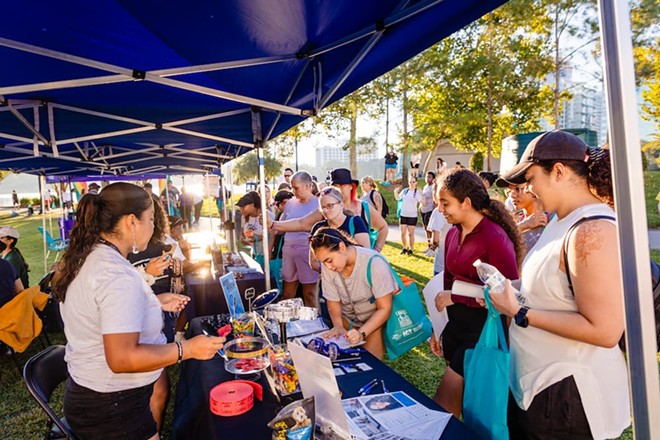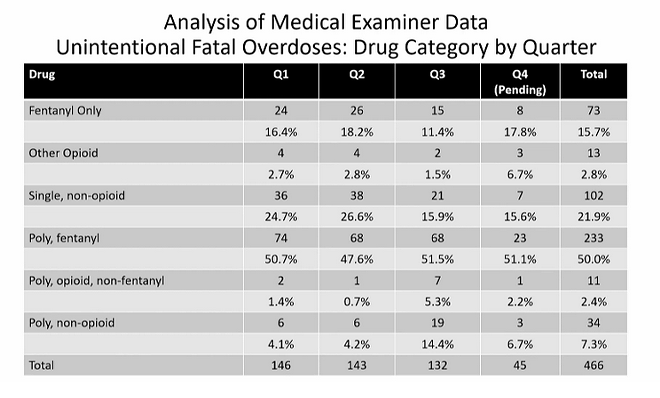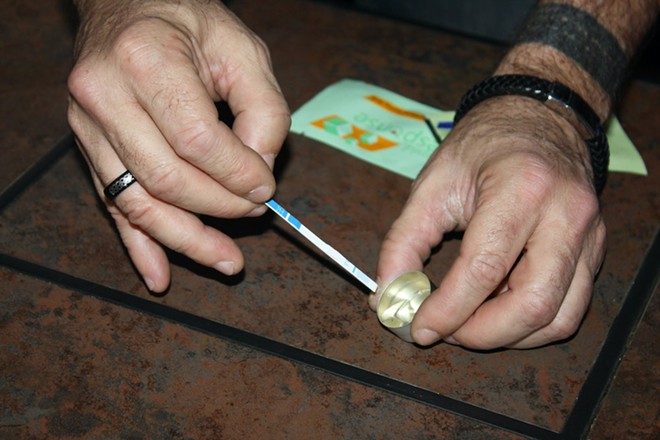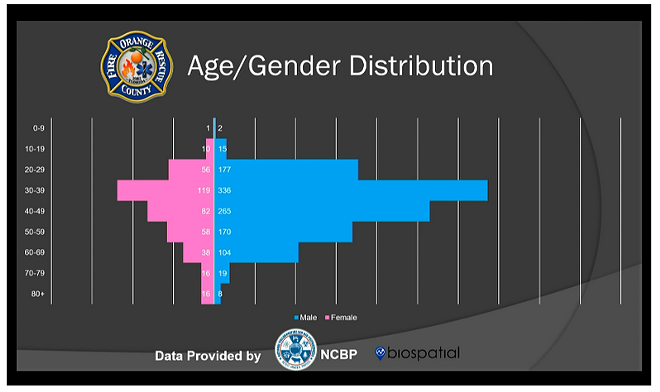
Orange County’s health services department is moving forward with a new initiative to help curb drug overdoses, using funds from national opioid settlements.
Hundreds of people died of drug overdose in Orange County last year alone. Most of those deaths involved fentanyl, a highly potent opioid painkiller that can be deadly for the average person if ingested in small, unregulated doses.
The county’s Office for a Drug-Free Community, targeting a trend of fatal overdoses involving fentanyl, cocaine and meth, now plans to distribute fentanyl test strips, a tool that can effectively detect the presence of fentanyl in powdered drugs. The county has partnered with two organizations — Largest Heart and Project Opioid — to spearhead the effort.
Largest Heart officially launched their county-funded “Test Before You Try” program last month at the Central Florida Fair, while Project Opioid plans to begin their own distribution program, focusing on the downtown Orlando area, in the coming weeks.
In recent years, communities across the United States — including Orange County — have seen a notable rise in overdose deaths involving drugs like cocaine and meth, laced with fentanyl. Fentanyl, a synthetic opioid about 100 times more potent than morphine, can be legally prescribed for pain, but it's also widely found in drugs bought and sold through the illicit market.
Last year, a combination of fentanyl and other drugs made up roughly half of the county’s overall number of fatal drug overdoses, according to data from the Medical Examiner’s office, analyzed by UCF’s Institute for Social and Behavioral Science. Out of 466 fatal overdoses reported, 73 were attributed to fentanyl alone, while 244 were attributed to a combination of either fentanyl or another opioid with non-opioid substances like alcohol, cocaine or meth.

Data shows that the number of fatal drug overdoses in Orange County last year largely remained stable compared to 2022, following a slight decrease from 2021.
According to experts, most people who die from an overdose involving fentanyl and another drug are not aware that their drugs have been laced. For example, a person might buy coke, or any street drug, not knowing that it’s been cut with fentanyl. Traces of fentanyl have also been found in counterfeit pills, and in rarer instances, in marijuana.
And that’s where the danger lies. If you don’t have a tolerance for opioids built up through chronic use, ingesting just a small amount of fentanyl can be deadly.
“A lot of our chronic [opioid] users, their tolerance is pretty built up, so they're not the ones that are actually overdosing and dying,” said Jamie Bridges, a licensed clinical social worker and director of Orlando Health’s opioid use program, during a public Opioid Advisory Committee meeting last month. “It's people that are accidentally getting fentanyl when they think it's something else.”
Dr. Thomas Hall, director of Orange County’s Office for a Drug-Free Community, told Orlando Weekly he’s heard this from local parents as well, people whose adult or minor children have overdosed.
Locally, fentanyl has most frequently been found mixed into coke and meth. Dr. Hall added, however, that anyone buying pills illegally should also be wary. “Anytime somebody buys a pill off the street, they should assume it's more likely that it's contaminated with fentanyl,” he said.
“Anytime somebody buys a pill off the street, they should assume it's more likely that it's contaminated with fentanyl”
tweet this
According to the Centers for Disease Control and Prevention (CDC), more than 109,000 people died of fatal drug overdose in 2022 nationwide, with more than 70% of these deaths involving primarily fentanyl or fentanyl analogs (chemically similar substances). In Florida, drug overdose deaths slightly decreased in 2022, according to the state Department of Health, representing the first decline the state has seen since 2018.
Nonetheless, nearly 8,000 people lost their lives — and their families, a loved one.
Dr. Hall underscored the importance of raising awareness about the problem. “It really speaks to the need for us to get the word out about fentanyl test strips, and to even provide fentanyl test strips,” he said to the local opioid committee, which meets quarterly to discuss strategies for combating the opioid crisis.

Fentanyl test strips are small, unobtrusive and relatively inexpensive. They strips work best for testing drugs in powder form, according to Hall; they are less effective with pills (since you would have to crush those up).
It’s also no longer technically illegal to have or use them. Last year, Florida lawmakers passed a law to decriminalize fentanyl test strips, which had previously been defined under decades-old statutes as “paraphernalia.” Drug paraphernalia, as defined under state law, is illegal to possess, sell or manufacture, subject to certain penalties.
Substance use experts and advocates say the strips can be life-saving. Florida is one of over a dozen states in recent years that have changed their laws to make it clear it’s no longer a crime to have fentanyl test strips or to share them.
According to Dr. Hall, a clinician with over 25 years of experience in treating substance use disorders, the county plans to use about $100,000 in funds from national opioid settlements to both purchase fentanyl test strips and fund its new distribution programs.
The county is set to receive an average $5 million over the next five years that will go toward various treatment, recovery, prevention and harm reduction projects. The actual amount allocated to the county will vary some each year.
The test strip distribution effort is data-informed, based on county heat maps showing where overdoses are most frequently being reported and when.
Many calls for suspected overdoses last year were concentrated in the downtown Orlando area, where there’s a large transient population around the Lynx Central Station transit hub.
The bulk of overdose calls come in on Friday and Saturday nights, according to data from EMS Orange County Fire Rescue. More cases involved men than women, and most fell in the age range of 30 to 39.

Project Opioid, one of the organizations that’s contracted with the county to distribute fentanyl test strips, plans to begin distributing fentanyl test strips outside downtown bars soon, according to Dr. Hall. The group has, in the past, also distributed Narcan, an opioid antagonist that's capable of reversing an overdose if it's administered soon enough.
Distribution of the test strips is expected to occur on Thursday, Friday and Saturday nights, once that effort kicks off. “I’m really excited to see it get off the ground,” Hall said.
Meanwhile, Largest Heart — the other group the county has contracted with — will pass out fentanyl test strips at local events deemed high-risk, like major fairs or festivals. Their project launched last month at the Central Florida Fair.
According to Peter Cook, founder of Largest Heart, the group gave out 500 fentanyl test strips at the fair, and 254 individuals and families signed up for free “Test Before You Try” fentanyl test kits to be mailed to them.
“The reception from the community at the event was incredible,” Cook shared over email.
Dr. Hall acknowledged some of the controversy around fentanyl test strips — namely, the false notion that passing them out in some way promotes drug use.
“I think the important piece is to recognize just like, 20 years ago or 30 years ago when condoms became popular to give out, there was a lot of people that said that was promoting risky sex,” he said. “And I think what we've seen over time is those attitudes are no longer as prevalent.”
Harm reduction advocates argue that fentanyl test strips merely help ensure that if a person is going to use drugs, they have the resources to do so safely. With overdose an ever-present risk, fentanyl test strips are seen as just one important way to help save lives.
Other projects the county is also pursuing with its opioid settlement funds include treatment and recovery initiatives — like a mobile medication-assisted treatment clinic for opioid use disorder, and stronger treatment and recovery programs embedded in local hospitals and the Orange County jail.
While the vast majority of U.S. jails and prisons do not offer the gold standard care for opioid addiction, Orange County Jail does. Data shows those who are incarcerated have a much higher rate of substance use disorder compared to the general population, and overdose is the leading cause of death for those who are recently released.
The county is also looking into an initiative from the U.S. Department of Labor, called “Recovery Ready Workplaces.” This program encourages businesses to adopt policies and practices aimed at reducing the risk of substance use and encouraging employees who are in recovery from a drug or alcohol problem.
“We're never going to outspend those who are bringing this kind of harm to our community,” Dr. Hall told the local committee last month. “The best we can do is to be as judicious with the funds that we have, demonstrate outcomes, and through those demonstrated outcomes, seek additional funds to expand those programs.”
Follow us: Apple News | Google News | NewsBreak | Reddit | Instagram | Facebook | Twitter | or sign up for our RSS Feed





















